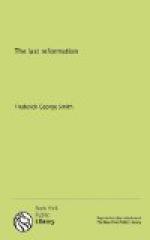“Rulers of the Roman Empire,” he begins, “you surely can not forbid the truth to reach you by the secret pathway of a noiseless book. She knows that she is but a sojourner on the earth, and as a stranger finds enemies; and more, her origin, her dwelling-place, her hope, her rewards, her honors, are above. One thing, meanwhile, she anxiously desires of earthly rulers—not to be condemned unknown. What harm can it do to give her a hearing?... The outcry is that the state is filled with Christians; that they are in the fields, in the citadels, in the islands. The lament is, as for some calamity, that both sexes, every age and condition, even high rank, are passing over to the Christian faith.
“The outcry is a confession and an argument for our cause; for we are a people of yesterday, and yet we have filled every place belonging to you—cities, islands, castles, towns, assemblies, your very camp, your tribes, companies, palace, senate, forum. We leave to you your temples alone. We can count your armies: our numbers in a single province will be greater. We have it in our power, without arms and without rebellion, to fight against you with the weapon of a simple divorce. We can leave you to wage your wars alone. If such a multitude should withdraw into some remote corner of the world, you would doubtless tremble at your own solitude, and ask, ‘Of whom are we the governors?’
“It is a human right that every man should worship according to his own convictions ... a forced religion is no religion at all.... Men say that the Christians are the cause of every public disaster. If the Tiber rises as high as the city walls, if the Nile does not rise over the fields, if the heavens give no rain, if there be an earthquake, if a famine or pestilence, straightway they cry, Away with the Christians to the lions.... But go zealously on, ye good governors, you will stand higher with the people if you kill us, torture us, condemn us, grind us to the dust; your injustice is the proof that we are innocent. God permits us to suffer. Your cruelty avails you nothing.... The oftener you mow us down, the more in number we grow; the blood of Christians is seed. What you call our obstinacy is an instructor. For who that sees it does not inquire for what we suffer! Who that inquires does not embrace our doctrines? Who that embraces them is not ready to give his blood for the fulness of God’s grace?”
[Sidenote: The woman’s flight]
Under the figure of Michael and his angels, the early church is represented as victorious in casting down the powers of heathenism; but under the symbol of the woman, the church is apparently represented as defeated; for after the casting down of the dragon it is said, “To the woman were given two wings of a great eagle, that she might fly into the wilderness, into her place, where she is nourished for a time, and times, and half a time, from the face of the serpent” (verse 14). This agrees with verse 6, where it is said that “the woman fled into the wilderness, where she hath a place prepared of God, that they should feed her there a thousand two hundred and three score days.”




